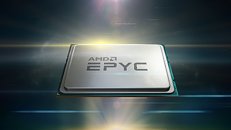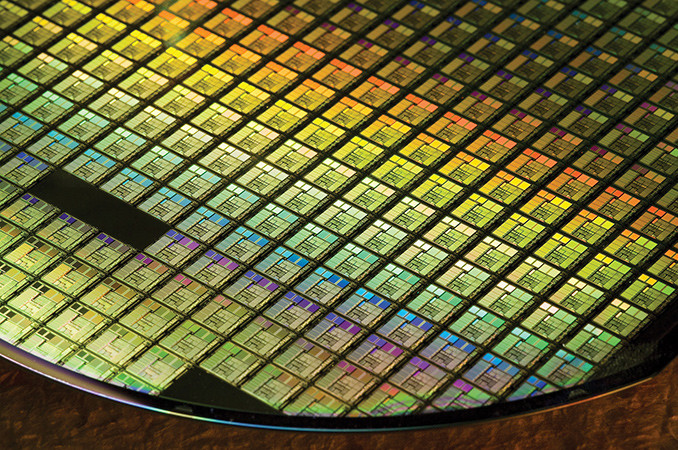- Joined
- Oct 9, 2007
- Messages
- 47,528 (7.48/day)
- Location
- Hyderabad, India
| System Name | RBMK-1000 |
|---|---|
| Processor | AMD Ryzen 7 5700G |
| Motherboard | ASUS ROG Strix B450-E Gaming |
| Cooling | DeepCool Gammax L240 V2 |
| Memory | 2x 8GB G.Skill Sniper X |
| Video Card(s) | Palit GeForce RTX 2080 SUPER GameRock |
| Storage | Western Digital Black NVMe 512GB |
| Display(s) | BenQ 1440p 60 Hz 27-inch |
| Case | Corsair Carbide 100R |
| Audio Device(s) | ASUS SupremeFX S1220A |
| Power Supply | Cooler Master MWE Gold 650W |
| Mouse | ASUS ROG Strix Impact |
| Keyboard | Gamdias Hermes E2 |
| Software | Windows 11 Pro |
At the European launch in Rome, Italy AMD today highlighted the growing adoption of 2nd Gen AMD EPYC processors across cloud, enterprise and HPC customers. "Today, we are proud to have new platforms from Dell and new customers adopting 2nd Gen AMD EPYC for cloud, enterprise computing and HPC," said Forrest Norrod, senior vice president and general manager, Datacenter and Embedded Solutions Business Group. "We continue to take the AMD EPYC processor to new heights and are thrilled to have the ecosystem supporting us across hardware, software and cloud providers as we face the challenges of the modern data center head-on."
AMD also announced a new addition to the 2nd Generation AMD EPYC family, the AMD EPYC 7H12 processor. The 64 core/128 thread, 2.60 GHz base frequency, 3.30 GHz max boost frequency, 280 W TDP processor is specifically built for HPC customers and workloads, using liquid cooling to deliver leadership supercomputing performance. In an ATOS testing on their BullSequana XH2000, the new AMD EPYC 7H12 processor achieved a LINPACK score of ~ 4.2 TeraFLOPS, ~11% better than the AMD EPYC 7742 processor.

Highlights
View at TechPowerUp Main Site
AMD also announced a new addition to the 2nd Generation AMD EPYC family, the AMD EPYC 7H12 processor. The 64 core/128 thread, 2.60 GHz base frequency, 3.30 GHz max boost frequency, 280 W TDP processor is specifically built for HPC customers and workloads, using liquid cooling to deliver leadership supercomputing performance. In an ATOS testing on their BullSequana XH2000, the new AMD EPYC 7H12 processor achieved a LINPACK score of ~ 4.2 TeraFLOPS, ~11% better than the AMD EPYC 7742 processor.

Highlights
- Dell Technologies announced five new Dell EMC PowerEdge platforms powered by the 2nd Gen AMD EPYC processor. These platforms were designed from the ground up and optimized to support the features of the new AMD EPYC processor including PCIe 4.0.
- IBM Cloud detailed how 2nd Gen EPYC processors can support IBM Cloud customer needs in specific areas including helping improve cloud security, better memory bandwidth for big data and analytics workloads and core scaling and breakthrough performance for container workloads. IBM plans to have more to share in 2020 about its performance offerings for clients.
- Nokia highlighted how 2nd Gen EPYC processors significantly accelerate its Cloud Packet Core system which helps service providers deliver converged broadband, IoT, and machine-type communication services for 5G. In testing, Nokia found its Cloud Packet Core system with 2nd Gen AMD EPYC provided a 2X increase in packet throughput compared to previous systems.
- ATOS, a global leader in digital transformation, announced Genci is using the 2nd Gen AMD EPYC processors to expand the use of supercomputing for the benefit of French scientific communities. Genci and ATOS are using the 2nd Gen AMD EPYC processor due to its breakthrough performance, efficiency and TCO.
- OVHcloud, a global cloud provider specializing in delivering industry-leading performance and cost-effective solutions, announced a new high-end hosting instance based on the AMD EPYC 7402P processor. This instance will be available at the end of 2019.
- TSMC announced its adoption of 2nd Gen AMD EPYC helping power its next generation research and leading process technology.
View at TechPowerUp Main Site





 Hi I don't mind if that happens I am buying shares on a schedule so if it goes down a bit I don't mind. Seriously though right now AMD rules Youtube.
Hi I don't mind if that happens I am buying shares on a schedule so if it goes down a bit I don't mind. Seriously though right now AMD rules Youtube.